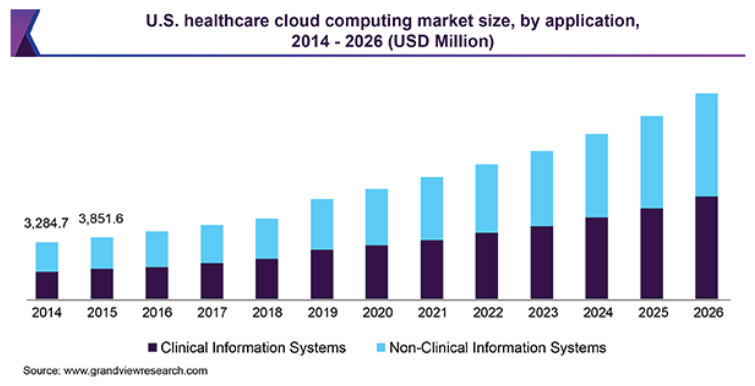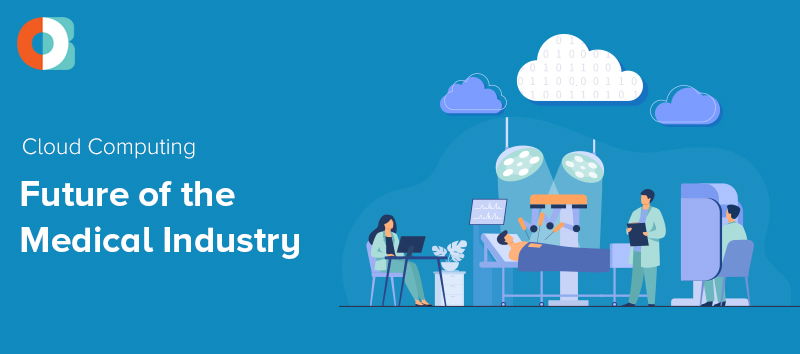The consumption, storage, and sharing of healthcare data have all changed dramatically. The healthcare industry has come a long way in terms of optimizing its data management practices, from traditional storage to digitalization of healthcare data. The healthcare industry, which has historically lagged behind its peers in terms of cloud adoption, is now leading the pack. Cloud computing's widespread adoption in healthcare goes far beyond simply storing data on cloud architecture. Healthcare professionals have begun to incorporate cloud solutions into their work as they adapt to the ever-changing world of technology. Healthcare providers now utilize this technology to gain efficiencies, optimize workflows, lower healthcare delivery costs and provide personalization in care plans to improve outcomes. If you are intrigued to know how cloud computing became so popular in healthcare to the benefits it offers, read this article to discover all about it.

Benefits of Cloud Computing for Healthcare
The Healthcare industry is one of the vast industry which helps people maintaining and improving health via possible treatment, prevention, diagnosis, cure of diseases and other impairments. To support and restore people's physical and mental health, it has become essential to use this revolutionary technology that can help the industry leaders increase work efficiency and reduce the overall cost. Here we have listed some of the top benefits of cloud computing in healthcare that can impact while offering excellent services.
1. Patient Interaction That Improves Patient Care
Patient care can be improved with the use of a cloud-based healthcare solution. The patient can easily schedule his appointment with the doctor with just a few clicks. With the cloud platform's help via AWS simple notification services like SMS or Email, auto-reminders can be successfully sent to both the doctor and the patient. Such services can also be used for patient follow-up. The cloud platform can handle timely interaction with doctors after surgery, a reminder for medicine usage, upcoming facility information, and many other use cases. Doctors can also monitor patient vitals remotely with the help of cloud-connected medical infusion pumps.
2. Access to Advanced Analytics
Healthcare data, both structured and unstructured, is a tremendous resource. In the cloud, relevant patient data from various sources can be collated and computed. Medical research can be boosted by using Big Data analytics and artificial intelligence algorithms on cloud-stored patient data. Processing large datasets become more feasible thanks to the cloud's advanced computing power. Analyzing patient data can also lead to developing more personalized care plans for patients on an individual basis. It also ensures that all pertinent patient information is recorded and that nothing is overlooked when prescribing treatments.
3. Better Scalability
Aside from being efficient and dependable, cloud-based healthcare solutions are also scalable, allowing users to scale up or down infrastructure to accommodate new data quickly. The current COVID pandemic in the country is the best example of this. It has placed healthcare systems in a precarious position. For such unforeseen circumstances, a cloud solution may be the best option. AWS auto-scaling and load balancing services are highly recommended and used by many hospitals in the current situation.
4. Custom Payment Models and a Cost-Effective Solution
An organization can eliminate costly on-premise computer networking with the help of cloud infrastructure. It cuts the cost of IT staff and other on-premise infrastructure monitoring and management solutions significantly. At the same time, you won't have to worry about updating or adopting new changes because cloud service providers can handle it for you in no time. AWS, for example, offers a pay-as-you-go model for more than 160 cloud services. Such models allow you to pay only for the specific services you require, for as long as you need them, and without the need for long-term contracts.
5. Capabilities in Telemedicine
The ability to access data from a distance is one of the most significant benefits of cloud storage. The combination of cloud computing and healthcare can improve telemedicine, post-hospitalization care plans, and virtual medication adherence, among other healthcare-related functions. Telehealth improves access to healthcare services as well. Telemedicine apps make healthcare delivery more convenient while also enhancing the patient experience. Telehealth systems and apps that run on the cloud make it easy to share medical information and improve accessibility.
6. Access to Medical Records in One Place
Until recently, almost all hospitals had separate files or medical records for their various doctor visits. Maintaining and managing the paperwork was extremely difficult for the doctors and staff. Cloud migration has now replaced this and made it simple. In today's healthcare centres, all files and reports are stored in a single centralized location that can be accessed via a web portal. Organizations can use the AWS S3 service or Azure Blob storage to store and retrieve medical record files. Using managed services such as AWS Glacier, the system can also set up periodic backups. Patients don't have to keep track of physical files, and doctors can work together more efficiently.
7. Machine Learning and AI
Large cloud providers provide AI and machine learning capabilities, allowing healthcare organizations to learn more about their patients and populations. Unsupervised learning and deep learning are two types of machine learning that can identify patterns that humans have not yet discovered.
8. Data in Real-time
The healthcare industry's ability to process data has increased as it has become more digital. Rather than tracking patient data in batches, organizations are increasingly monitoring patients in real-time so that they can intervene more quickly, improving patient health outcomes and lowering overall healthcare costs.
Future of Cloud Computing in Healthcare
The use of cloud computing in healthcare has a bright future. If organizations want to transform their care and efficiency, they need to start scaling modernization initiatives. This transformation is made possible by hastening the migration of workloads from data centres to the cloud.
According to Garter, Cloud computing actually started in the US and they have been leading the way since 2015, according to cloud computing statistics by country. By 2022, cloud adoption in other countries will be significantly lower.
In the future, healthcare organizations should concentrate on technologies and solutions that enable them to provide the highest possible level of care. Organizations should also think outside of the box when it comes to caring settings. Finally, they must comprehend the value that high-performance computing, artificial intelligence, and machine learning can provide. It can help to clarify the options for computing platforms.
Limitations of Cloud Computing in Healthcare
- The most significant impediment to cloud adoption in healthcare is the potential security risk. Patient data is inherently sensitive, and cloud-hosted healthcare data must be protected from outside threats.
- While the cloud provides more excellent reliability, downtimes are unavoidable. You can overcome any downtime if you have contingency planning in place and are prepared for a possible failure. When developing cloud applications, designing for loss is recommended as a best practice.
- The inability to find a software company that works with this brand new technology is one of the most significant challenges of cloud computing in healthcare.
- Cloud computing is insufficient on its own. You'll also need intelligent connected devices, artificial intelligence, and master data management to build an effective analytics architecture.
- Companies that provide cloud services manage multiple clients simultaneously, which can lead to problems and support issues. There's also a chance that service providers will experience outages, which will impact the performance and business of healthcare organizations.
In the end
In the healthcare industry, cloud computing still has a long way to go. Its use in conjunction with rapidly evolving technologies such as Big Data analytics, artificial intelligence, and the internet of medical things improves efficiency. It expands the number of ways to streamline healthcare delivery. It improves resource availability, improves interoperability, and reduces costs. The development of cloud computing in the medical industry is an evergoing process. There's no reason not to adopt a cloud with so many advantages and plans in place to overcome the obstacles! For more information you can contact our team of experts. Our team of experts holds years of rich experience with expertise in the field.




















.jpg)
.jpg)
.jpg)
